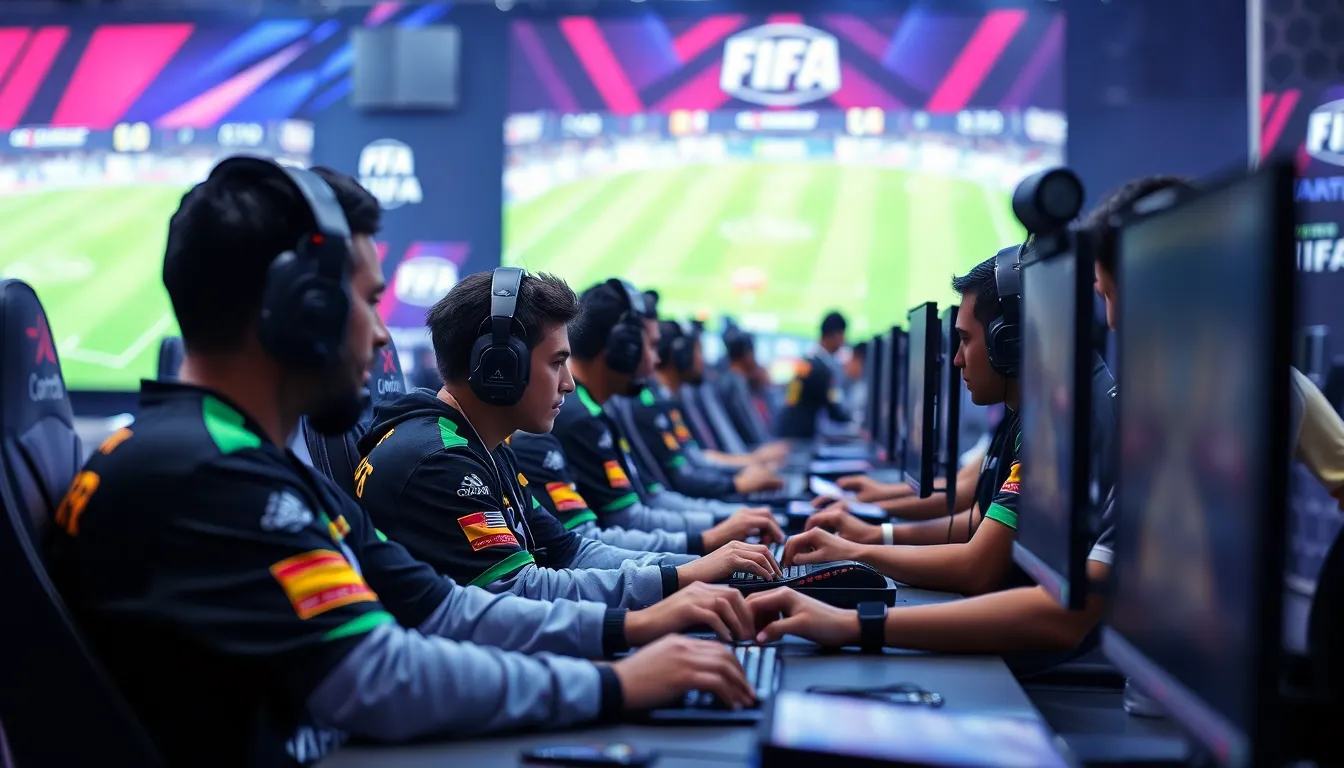Table of Contents
ToggleThe FIFA eWorld Cup has transformed the landscape of competitive gaming, uniting football fans and gamers from around the globe. This annual tournament showcases the best FIFA players, offering them a platform to demonstrate their skills and compete for glory. It’s not just a competition; it’s a celebration of football culture in the digital age.
As the stakes rise, so does the excitement surrounding the event. Players battle it out for a chance to become world champions, with millions of viewers tuning in to witness the action. With its blend of strategy, skill, and passion for the beautiful game, the FIFA eWorld Cup captivates audiences and elevates esports to new heights.
Overview of FIFA eWorld Cup
The FIFA eWorld Cup showcases the intersection of competitive gaming and football, drawing a global audience and elevating esports. This tournament highlights the skill of elite FIFA players striving for the championship title.
History and Evolution
The FIFA eWorld Cup originated in 2004 as the FIFA Interactive World Cup (FIWC). It aimed to unite gamers and football enthusiasts through virtual competition. In 2019, FIFA streamlined the branding to the FIFA eWorld Cup, enhancing the tournament’s status in the esports community. Since its inception, the competition has grown significantly, attracting millions of participants and viewers. The tournament’s structure evolved to incorporate online qualifiers and live final events, allowing for greater accessibility and engagement.
Format and Structure
The FIFA eWorld Cup follows a structured format that combines online and offline play. Players first compete in online qualifiers, which typically feature thousands of competitors. The top players advance to the regional playoffs, which determine the finalists for the main event. The final tournament is held in an exciting live setting, allowing fans to experience the matches firsthand. The tournament consists of individual matches, with a best-of-three format often employed, ensuring that skill and strategy shine through. This structured approach enhances competitiveness and provides an engaging viewing experience for fans globally.
Key Players and Teams

The FIFA eWorld Cup features elite competitors and teams vying for the prestigious title, showcasing exceptional talent and strategic gameplay at every event.
Notable Competitors
- Msdossary: A Saudi Arabian player known for his fast, agile playstyle, Msdossary secured the FIFA eWorld Cup title in 2018, showcasing his remarkable tactical awareness.
- Nicolas99fc: This Argentine player quickly rose to prominence with his strong fundamentals and diverse strategies, finishing as a runner-up in several tournaments, including the FIFA eWorld Cup.
- Shellzz: An English competitor recognized for his consistent performance and adaptability, Shellzz has proven himself in various esports tournaments, consistently reaching the later stages of the competition.
- Yago: A Brazilian player who has captivated fans with his creative gameplay, Yago’s skills earned him significant recognition, including multiple wins in regional qualifiers.
- Dax: A rising star from Germany, Dax has caught the attention of the esports community for his technical skills and innovative strategies in high-pressure situations.
Team Strategies
- Offensive Play: Many teams adopt aggressive tactics, prioritizing fast-paced offensive movements to apply pressure on opponents and create scoring opportunities.
- Defensive Structure: Effective teams frequently emphasize strong defensive setups, focusing on maintaining formation and utilizing player positioning to counter an opponent’s attacks.
- Set Pieces: Teams often train extensively on set-piece execution, turning free kicks and corner opportunities into crucial scoring chances.
- In-Game Adaptability: Successful teams adjust strategies mid-match, responding to opponents’ playstyles and modifying tactics as needed based on game dynamics.
- Team Communication: Coordination among teammates is vital in the FIFA eWorld Cup, as effective communication enhances teamwork, leading to improved performance during matches.
Tournament Highlights
The FIFA eWorld Cup features numerous thrilling matches and remarkable player performances throughout its history. Each event showcases the intensity and excitement that defines competitive esports.
Memorable Matches
- 2018 Final: Msdossary vs. Stefano Pinna
The 2018 final delivered an unforgettable showdown, with Msdossary overcoming Stefano Pinna to claim the championship. The match concluded with a score of 4-0, highlighting Msdossary’s exceptional skills and strategic gameplay.
- 2020 Semifinals: Nicolas99fc vs. Shellzz
The 2020 semifinals featured a gripping battle between Nicolas99fc and Shellzz, ending in a nail-biting 6-5 victory for Nicolas99fc. The match exemplified skill and tactical depth, captivating fans with numerous lead changes and dramatic goals.
- 2021 Group Stage: Yago vs. Dax
In the 2021 group stage, Yago faced Dax in a high-stakes match filled with tension and excitement. Yago won 3-2, showcasing remarkable composure under pressure while executing crucial plays that left the audience on the edge of their seats.
Standout Performances
- Msdossary
Msdossary consistently ranks among the top players in the FIFA eWorld Cup, acclaimed for his strategic approach and precise finishing. His ability to adapt to opponents’ styles enhances his gameplay, making him a formidable competitor.
- Nicolas99fc
Nicolas99fc stands out with his aggressive playstyle and quick decision-making. Known for his sharp reflexes and ability to anticipate plays, he has earned multiple top finishes and continues to impress audiences and fans alike.
- Yago
Yago captivates viewers with his creativity and unique gameplay tactics. His impressive dribbling skills and innovative strategies have garnered considerable attention, solidifying his reputation as an emerging star in the tournament.
- Dax
Dax displays remarkable consistency and composure throughout his matches. His strong defensive gameplay combined with strategic offensive tactics allows him to challenge even the top contenders in the FIFA eWorld Cup.
Impact on Esports and Gaming
The FIFA eWorld Cup significantly influences the esports and gaming landscape, serving as a catalyst for growth and recognition within the industry. Its achievements extend beyond pure gameplay, fostering a community that bridges traditional sports and digital competition.
Popularity Growth
Popularity of the FIFA eWorld Cup has surged since its inception. In recent years, viewership numbers reached several million, with events attracting global audiences. FIFA reported that the 2021 tournament garnered over 30 million viewers across various platforms. Player engagement expanded with over 40,000 competitors participating in online qualifiers for the same year. As interest in esports grows, the FIFA eWorld Cup continues to captivate fans, driving increased engagement with both the gaming community and traditional football enthusiasts.
Sponsorship and Investment
Sponsorship and investment in the FIFA eWorld Cup underline its importance in the esports arena. Major brands recognize the tournament’s influence, leading to substantial financial support from companies like Coca-Cola, EA, and PlayStation. In 2022, sponsorship revenue for esports events surpassed $1 billion globally, with a significant portion coming from football-related gaming. These investments not only elevate the tournament’s profile but also promote growth for esports as a whole. Enhanced sponsorship opportunities have initiated collaborations that merge gaming with in-game achievements, offering fans unique experiences that blend the physical and digital realms.
Future of FIFA eWorld Cup
The FIFA eWorld Cup’s future looks promising, characterized by growth and innovation. Various factors could shape the tournament’s path, enhancing its appeal to players and fans alike.
Upcoming Changes
Upcoming changes may include modifications to tournament formats and the introduction of new qualifying methods. Enhancements in broadcasting technology could provide immersive viewing experiences, allowing fans to engage more deeply with matches. Plans for increased regional events might expand accessibility and participation globally. Additionally, partnerships with emerging platforms could further integrate FIFA eWorld Cup into the broader esports ecosystem, attracting new audiences and sponsors.
Predictions for Next Season
Predictions for next season suggest a rise in the level of competition, driven by an influx of skilled players from diverse backgrounds. Increased regional representations may lead to the emergence of underdog teams, adding excitement and unpredictability to matches. Viewership numbers might continue to surge, potentially reaching record highs as digital engagement strategies evolve. Advancements in game mechanics and updates may influence strategies, leading to more dynamic gameplay and thrilling match outcomes. The overall synergy between traditional sports and esports is likely to strengthen, positioning the FIFA eWorld Cup as a key player in the future of competitive gaming.
The FIFA eWorld Cup stands as a beacon of innovation in the esports realm. By merging the worlds of football and gaming, it captivates millions and elevates competitive play to unprecedented levels. As the tournament continues to evolve, it fosters a vibrant community of players and fans alike.
With its impressive growth trajectory and the potential for enhanced engagement, the future looks bright for the FIFA eWorld Cup. The excitement surrounding upcoming tournaments promises to draw in even more participants and viewers. As the lines between traditional sports and esports blur, the FIFA eWorld Cup is poised to remain at the forefront of this thrilling evolution.






